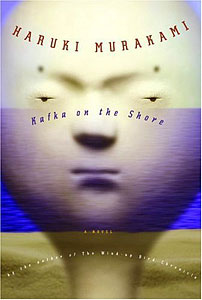 I'm going to cheat a little and throw in the Amazon.com review here, because I need some fuel to get started on this one.
I'm going to cheat a little and throw in the Amazon.com review here, because I need some fuel to get started on this one.
Joining the rich literature of runaways, Kafka On The Shore follows the solitary, self-disciplined schoolboy Kafka Tamura as he hops a bus from Tokyo to the randomly chosen town of Takamatsu, reminding himself at each step that he has to be "the world's toughest fifteen-year-old." He finds a secluded private library in which to spend his days--continuing his impressive self-education--and is befriended by a transgendered clerk and the mysteriously remote head librarian, Miss Saeki, whom he fantasizes may be his long-lost mother. Meanwhile, in a second, wilder narrative spiral, an elderly Tokyo man named Nakata veers from his calm routine by murdering a stranger. An unforgettable character, beautifully delineated by Murakami, Nakata can speak with cats but cannot read or write, nor explain the forces drawing him toward Takamatsu and the other characters.
To say that the fantastic elements of Kafka On The Shore are complicated and never fully resolved is not to suggest that the novel fails. Although it may not live up to Murakami's masterful The Wind-Up Bird Chronicle, Nakata and Kafka's fates keep the reader enthralled to the final pages, and few will complain about the loose threads at the end. --Regina Marler
Ok, I will complain about the loose threads at the end. I thought the story worked wonderfully taken literally, and he'd just kept it in the realm of the literal instead of the metaphorical, this would have been a great fantasy novel. As it was, it was a very good book simply because Murakami hooks you with the powerful characters in this story. Not powerful as in "they are strong", but in the sense that they all have a powerful presence. Murakami makes characters so real they seem to want to lift off the pages, and this despite, or perhaps because of, their strange quirks. No one is exactly what they seem. Even the trucker becomes more through contact with the old man.
The story was still intriguing, and I was so painfully disappointed when, in the end, there wasn't really any resolution. Was Colonel Sanders (yes, the Colonel Sanders) banished for good? What was the nature of the stone? What is the relationship between the boy and the librarian? And what did happen to Nakata when he was a boy?
But I guess to Murakami, he didn't see the answering of these questions as the purpose of the story, but rather the asking as the purpose of the characters. I tend to get really frustrated with books like that, because I just really want a resolution. But let my diatribe not fool you. I loved this book. It's always hard to tell with a translated version exactly what the author meant and wrote. But in any case, his story is about characters and about themes. Kafka and Nakata are the two poles around which the story revolves, and they somehow revolve around each other. Again, it's never exactly clear how or why. But if you love character stories (and in my opinion, character stories are some of the best in fiction, such as Look Homeward, Angel), then you will love this book.
This is another one of those books I can only describe as "dreamlike", and that's really not inappropriate, given that in this world dreams and reality blended together so often and so seamlessly. Events in dreams even provide impetus for events in reality, so it's certainly not safe to categorize all the dream events as metaphorical. Some weird stuff certainly does happen in this book, and that's part of what makes the story so entertaining. As the review says, Nakata can speak with cats...for real. It's not metaphorical; he really can talk to cats. They even tell him worthwhile information. Strange stuff.
Despite the confusing ending, Murakami draws you to it as inexorably as a moth to flame with his powerful narrative. You desire to keep on following and following the characters because they're so captivating, and of course to find out what happens in the end.
This isn't necessarily the easiest book to read, but it makes it all the more rewarding. So Nathan's recommendation is: read it!
1 comment:
Murakami's books are a work of surealism and one can easily get lost in his worlds. He uses words and imagery to create an out of body experience. Kafka on the Shore does leave a lot to be explained but I don't think that's unusual if you consider what genre it is.
Post a Comment